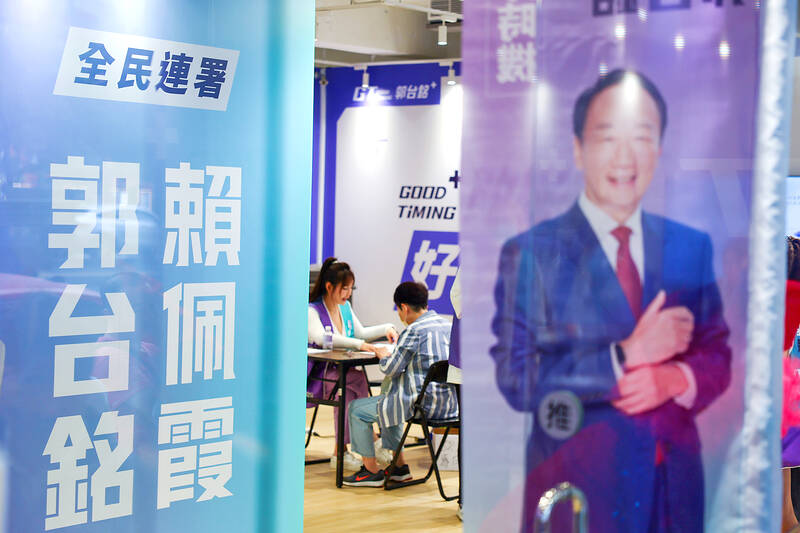One person has been detained, while six others have posted bail after being questioned by prosecutors on suspicion of purchasing personal information to use in Hon Hai Precision Industry Co (鴻海精密) founder Terry Gou’s (郭台銘) signature drive to appear on next year’s presidential ballot.
The detainee, a woman surnamed Shen (沈), and the other six were questioned by the Taipei Shilin District Prosecutors’ Office after being linked to an investigation into reports that some people were being paid NT$400 for their signatures, while others had no idea why their names were among the signatures gathered.
The seven are suspected of buying customer lists from pawnshops in New Taipei City and using the information for the signature drive, prosecutors said.

Photo: CNA
The suspects face charges for breaching the Presidential and Vice Presidential Election and Recall Act (總統副總統選舉罷免法), prosecutors said, adding that people who offer bribes and other undue benefits for a person’s signature during such a drive can be sentenced to up to seven years in prison and fined up to NT$10 million (US$309,138).
Similar cases have been reported across Taiwan, National Police Agency Director-General Huang Ming-chao (黃明昭) said yesterday.
Police are investigating reports of bribery, people buying lists of personal information and other illegal activities that have allegedly taken place at Gou’s signature drive stations, Huang said.
Local media reported that a business tycoon surnamed Chen (陳), who owns several hot spring hotels and properties in Taipei’s Beitou District (北投), was one of the six suspects who posted bail.
He reportedly paid NT$3 million, the highest bond posted, while the lowest paid was NT$15,000.
Gou’s campaign spokesman Huang Shih-hsiu (黃士修) denied any direct relationship with the suspects.
“Those local stations ... embroiled in bribery allegations are not associated with our official offices for Gou’s signature drive. We have nothing to do with those involved, and the people at our offices do not even know [them],” he said.
“When we started the signature drive, from day one, we stressed that there would be no financial benefit for people to sign on, as Guo and his aides have explicitly forbidden any illegal activities,” Huang Shih-hsiu said. “We shall cooperate with prosecutors for the investigation.”
Gou canceled all planned appearances yesterday, leading to speculation that it was was due to the investigation or because Chinese tax authorities had searched Hon Hai’s offices in China.
Gou’s campaign office yesterday morning announced that he would not attend a banquet at Jhongsing Temple (忠興宮) in New Taipei City’s Shulin District (樹林), which he had planned to attend with Taiwan People’s Party Chairman and presidential candidate Ko Wen-je (柯文哲).
Gou’s running mate, Tammy Lai (賴佩霞), took his place.
Huang Shih-hsiu said that Gou had just made changes to his personal itinerary and had not canceled because of either investigation.
“But Gou felt it was not quite proper, so he arranged for ... Lai to take his place ... [at] the Jhongsing Temple activities,” Huang said.
Additional reporting by Yang Kuo-wen
and Huang Ching-hsuan

CARROT AND STICK: While unrelenting in its military threats, China attracted nearly 40,000 Taiwanese to over 400 business events last year Nearly 40,000 Taiwanese last year joined industry events in China, such as conferences and trade fairs, supported by the Chinese government, a study showed yesterday, as Beijing ramps up a charm offensive toward Taipei alongside military pressure. China has long taken a carrot-and-stick approach to Taiwan, threatening it with the prospect of military action while reaching out to those it believes are amenable to Beijing’s point of view. Taiwanese security officials are wary of what they see as Beijing’s influence campaigns to sway public opinion after Taipei and Beijing gradually resumed travel links halted by the COVID-19 pandemic, but the scale of

TRADE: A mandatory declaration of origin for manufactured goods bound for the US is to take effect on May 7 to block China from exploiting Taiwan’s trade channels All products manufactured in Taiwan and exported to the US must include a signed declaration of origin starting on May 7, the Bureau of Foreign Trade announced yesterday. US President Donald Trump on April 2 imposed a 32 percent tariff on imports from Taiwan, but one week later announced a 90-day pause on its implementation. However, a universal 10 percent tariff was immediately applied to most imports from around the world. On April 12, the Trump administration further exempted computers, smartphones and semiconductors from the new tariffs. In response, President William Lai’s (賴清德) administration has introduced a series of countermeasures to support affected

Pope Francis is be laid to rest on Saturday after lying in state for three days in St Peter’s Basilica, where the faithful are expected to flock to pay their respects to history’s first Latin American pontiff. The cardinals met yesterday in the Vatican’s synod hall to chart the next steps before a conclave begins to choose Francis’ successor, as condolences poured in from around the world. According to current norms, the conclave must begin between May 5 and 10. The cardinals set the funeral for Saturday at 10am in St Peter’s Square, to be celebrated by the dean of the College

CROSS-STRAIT: The vast majority of Taiwanese support maintaining the ‘status quo,’ while concern is rising about Beijing’s influence operations More than eight out of 10 Taiwanese reject Beijing’s “one country, two systems” framework for cross-strait relations, according to a survey released by the Mainland Affairs Council (MAC) on Thursday. The MAC’s latest quarterly survey found that 84.4 percent of respondents opposed Beijing’s “one country, two systems” formula for handling cross-strait relations — a figure consistent with past polling. Over the past three years, opposition to the framework has remained high, ranging from a low of 83.6 percent in April 2023 to a peak of 89.6 percent in April last year. In the most recent poll, 82.5 percent also rejected China’s